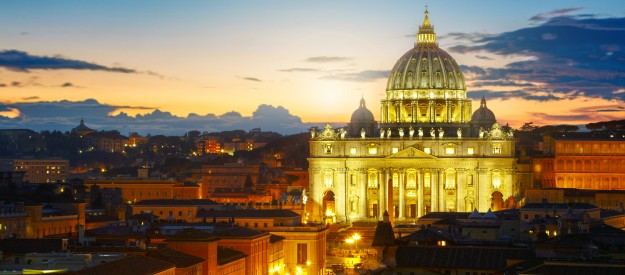"We are losing our attitude of wonder, of contemplation, of listening to creation and thus we no longer manage to interpret within it what Benedict XVI calls 'the rhythm of the love-story between God and man.'"
+ Pope Francis
Pontifical Prophecy on Ecology

It is no coincidence that in this age of worldwide social and moral crises — with the fundamentals of life and social foundations under attack — that we’re witnessing the drastic disappearance of species after species after species.
Of course, over the hundreds of millions of years of life on earth, naturally- occurring shifts in climate, volcanic activity or the occasional asteroid strike have caused rapid and irrevocable losses of a few or a great many forms of life. Science tells us that vast, planet-wide periods of extinction have occurred some five times since life’s beginnings. Number six is occurring right now, at rates projected to be thousands of times faster than ever before. But this time the causes aren’t natural.
Humanity’s use and abuse of natural resources, its patterns of development and its hunger for wealth (among other desires) is wiping out a good many forms of life that God had seen fit to bring into existence. Scientists can give one set of reasons for all this, but moral theologians can go deeper.
 First, we know that as you and I go about our daily routines others are busy slashing richly diverse rain forests, filling in critical wetlands, or fouling water bodies in ways that are deadly to the life forms that call them home. This is all a problem because species that contain important molecular and genetic secrets — the kinds that can create new drugs, or stronger crops — are being erased from existence before the human race ever gets to know them. Add to this over-hunting and over-fishing and the delicate relationships between predators and prey are thrown out of whack, causing some not so desirable forms of life — like mosquitoes and other disease-spreading creatures — to thrive, with disastrous results.
First, we know that as you and I go about our daily routines others are busy slashing richly diverse rain forests, filling in critical wetlands, or fouling water bodies in ways that are deadly to the life forms that call them home. This is all a problem because species that contain important molecular and genetic secrets — the kinds that can create new drugs, or stronger crops — are being erased from existence before the human race ever gets to know them. Add to this over-hunting and over-fishing and the delicate relationships between predators and prey are thrown out of whack, causing some not so desirable forms of life — like mosquitoes and other disease-spreading creatures — to thrive, with disastrous results.
Of course all this falls under the category that there are consequences to our actions. The extinction of entire species, which is reported to be occurring at a rate of one every twenty seconds, is a global phenomenon that has a very real potential for causing some grim times ahead. Recent research out of the University of Texas in Austin predicts that within two to three centuries, half of the bird and animal life on earth today will be extinct.
All of this has gotten the attention of scientists and governments. An upcoming conference in Germany will be bringing together a sizable group of politicians and researchers; but as we have seen in the related area of climate change, blending science and politics isn’t easy. Developing countries, like China, India and many in Central America, may not be keen on slowing economic growth based on this or that scientific study. And they have a point. Current superpowers like ours developed huge amounts of wealth in an age without much regard for the environment.
This is all very similar to another phenomenon occurring at present: prideful in our deluded perception that we have mastered the natural world, cultural superpowers — again, like ours — are seeking to undo not just natural laws, but moral ones, too.
These themes merged in the 1991 document issued by John Paul II, “Private Property and the Universal Destination of Material Goods.” In it he writes that “in addition to the irrational destruction of the natural environment, we must also mention the more serious destruction of the human environment, something which is by no means receiving the attention it deserves. Although people are rightly worried — though much less than they should be — about preserving the natural habitats of the various animal species threatened with extinction … too little effort is made to safeguard the moral conditions for an authentic ‘human ecology’. Not only has God given the earth to man, who must use it with respect for the original good purpose for which it was given to him, but man too is God's gift to man. He must therefore respect the natural and moral structure with which he has been endowed.”
These words were written almost two decades ago. Since then, evidence of their truth has only mounted, and staggeringly so. Perhaps this evidence will help us recognize that how we choose to use God’s gifts — equitably or not, responsibly or not, selflessly or not — is a matter of free will. What the consequences of our choices bring, however, are matters of natural and moral laws that no pretense or denial can extinguish.


















